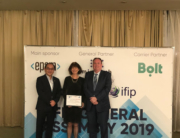This week saw the final event of the series celebrating IFIP’s 60th anniversary.
On Tuesday 21st December, a stellar cast of IFIP and UNESCO officials came together to recognise IFIP’s many achievements and contributions to the world. IFIP presidents – past, present and future – took part in the event, along with leaders from several of the organisation’s technical committees, member societies and more.
As IFIP was founded under the auspices of UNESCO, it was fitting that UNESCO Assistant Director-General for Communication and Information, Tawfik Jelassi, and UNESCO Information For All Program (IFAP) chair, Dorothy Gordon, joined IFIP to wrap up the Jubilee.
The event was co-moderated by former IFIP president and honorary member, Leon Strous and current president, Mike Hinchey. Speakers from IFIP and its member societies included:
- Anthony Wong, IFIP president-elect and chair of the #ifip60 Committee;
- Gabriele Kotsis, President of ACM;
- John Higgins, President of BCS;
- Jan Gulliksen, IFIP VP and fellow;
- Paula Kotze, IFIP fellow;
- Don Passey, Lancaster University;
- David Kreps, National University of Galway;
- Don Gotterbarn, University of East Tennessee;
- Moira de Roche, IP3 and IITPSA; and
- Margaret Havey, CIPS fellow.
In presenting the first address of the event, Dr Jelassi talked about how IFIP was established and praised its long and ongoing contribution to the use and understanding of technology in government, business, research and academia.
“Digital technologies offer unprecedented opportunities for access to information, freedom of expression, human connectivity and technological innovations as well as multistakeholder engagements,” he said. “They bring about new opportunities for citizens to access, use and share information, and thereby contribute to sustainable development. In addition, digital technologies have enabled individuals to stay connected throughout disruptions such as COVID19 and helped in responding to this global crisis
He explained that UNESCO works along five thematic pillars relating to technology:
- Freedom of expression and the safety of journalists, both online and offline;
- Universal access to information as a key component for building inclusive knowledge societies;
- Growing challenges of misinformation, disinformation and hate speech by promoting digital literacy and encouraging independent media;
- Preservation and accessibility of documentary heritage, including digital heritage; and
- Digital Transformation, harnessing technology to bridge digital divides and promote sustainable development.
Jelassi pointed to UNESCO’s work in running Africa Code Week for several years, which has enabled more than nine million African youth to be trained in coding skills, thanking IFIP TC3 (Education) for its ongoing support for this project.
UNESCO is also working with various African governments to build their capability and capacity in relation to AI as part of their digital transformation journey.
Jelassi said last month’s UN adoption of Recommendations on the Ethics of Artificial Intelligence and also on Open Science, are of great relevance to the work of IFIP and “provide importance frameworks for the international community as a whole to mobilise in the fields of AI and open solutions. Such normalisation is essential in responding to today’s and tomorrow’s challenges.”
He called on IFIP members to continue supporting the world in understanding emerging technologies and their potential impacts on our societies and raising the prevailing issues
“The large network of IFIP members represents a valuable asset that I hope will continue to expand in the years to come,” he said, thanking IFIP President Mike Hinchey for the valuable contributions IFIP has made during his Presidency and over the past 60 years.
“UNESCO looks forward to working with IFIP and I hope our ongoing and future cooperation will be successful in promoting and protecting information as a public good for sustainable development,” he concluded.
The Jubilee event completed with comments from Mr Hinchey, who talked about the many ways in which technology and technologists can contribute to the world, referencing examples relating to transport, space exploration, power generation, communications, healthcare, education and ecommerce.
He pointed to the United Nations Sustainable Development Goals, highlighting the importance in the current environment of Goal #3 – Good Health and Well-Being – and exploring ways in which IFIP and its members could contribute to the goal through technology solutions that enable:
- Health monitoring via emerging technologies;
- Remote contact / diagnosis / treatment; and
- Population and disease monitoring.
Hinchey also took time to congratulate the editors and writers of the two books published as part of IFIP’s Jubilee Celebrations, “Unimagined Futures – ICT Opportunities and Challenges” and “advancing research in Information and communication Technology.” Both are available for download here.
This and all past Future of Information Processing Events can be viewed on the IFIP YouTube channel.
IFIP TC3 Zanzibar Declaration: The Outcomes
Earlier this month, on 9th December, an event on the outcomes of the IFIP TC3 Zanzibar Declaration was co-moderated by Don Passey of Lancaster University and Raymond Morel of the University of Geneva.
The gathering featured five panellists from across academia:
- Cathy Lewin, Manchester Metropolitan University;
- Johannes Magenheim, Paderborn University;
- Mary Webb, King’s College London;
- Bernard Cornu, Université de Grenoble; and
- Margaret Leahy, Dublin City University.
The session was presented in hybrid format at Day 0 of the UN Internet Governance Forum (IGF) educational and social challenges to achieving “Sustainable Education in a Digital Age of Rapidly Emerging Technologies”.
This panel can be viewed on the IGF YouTube channel






